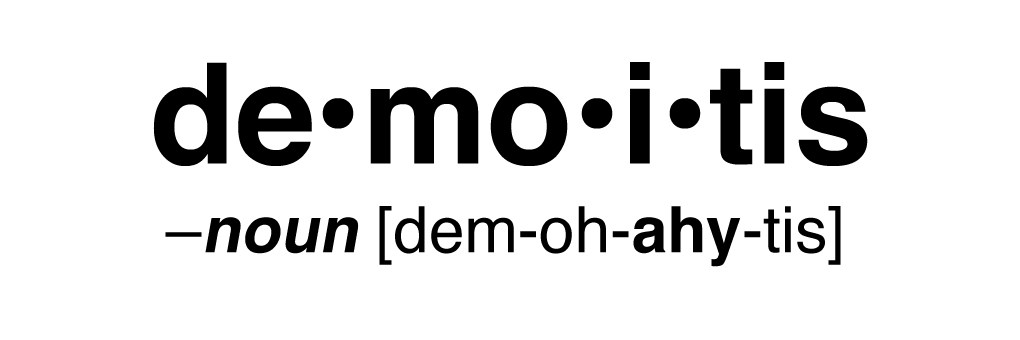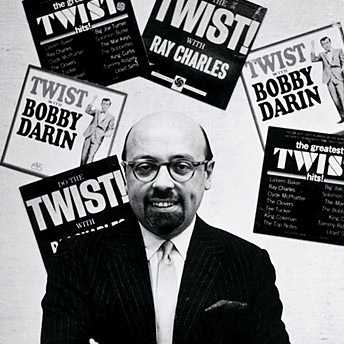Archive for April, 2013
Demoitis
Posted by Gavin Bradley in Labels, Management, Playing, Production, Singing, Writing on April 11, 2013
Studioitis isn’t the only widespread malady in the world of recording. There’s also the much more serious demoitis.
Artists often make quick ‘demo’ versions of songs they’ll consider recording properly later on. In fact, during the making of an album dozens of versions of a song might circulate for the consideration of the creative team in the studio, and sometimes the business team at the label. The differences in the demos may be subtle: slight variations in volume levels, an altered word here and there, a few bars edited out. Or they may be sweeping: a new draft of the lyrics, a different tempo, drastically rethought instrumentation. But when a collaborator or an executive fights to retain elements they’ve become attached to in an earlier iteration of a track they are said to have a case of demoitis.
Debates follow. Often heated, sometimes explosive.
‘I just can’t get used to that new line in the second verse. It feels awkward to me.’
‘Cut those four extra bars before the bridge. The demo got right into it…I wouldn’t have changed that.’
‘This new tempo doesn’t give me the energy the demo had. What happens if we speed up the final mix digitally?’
Though experienced musicians often agree when something is ‘wrong’ with a song, music is ultimately a subjective thing. And it can be particularly difficult to maintain perspective on an ever-changing song you’ve heard played back a hundred times. How do you decide what goes out to the public?
First, try to hold back on presenting a song to the label or the artist’s management until it’s as close to finished as possible.
Making creative decisions by committee can leave a piece of music bloodless. Especially when the incubatory environment of the studio has been opened up for business executives to phone in some input from their offices. I’ve been involved in situations where two ‘final’ versions of a song were given to a room of A&R people at a label to vote on. In the end they asked for the two ideas to be merged, creating a frankensteined chorus that didn’t really preserve what was good about either version.
In my opinion, the Clive Davises and David Geffens of the world—music business executives who aren’t necessarily experienced in creative work but have a golden ear—are few and far between. (Ahmet Ertegun at Atlantic and Berry Gordy at Motown are examples of label presidents with an inside understanding of craft. They spent a good amount of time writing and producing themselves.) From what I’ve experienced, the majority of music executives are business-minded people with a love for music. While they will jump at the opportunity to participate in a creative decision, much of their input seems arbitrary. Suggestions seem to be lifted from trends or rules they’ve heard bandied about in the office.
‘How about a dubstep breakdown in the bridge?’ was popular this past year.
‘What about a filtered radio voice in the intro?’ was big with executives around the turn of the millenium.
I don’t want to fault execs for wanting in on the excitement of making music, but if it’s actually a situation of ‘I want to be able to tell people I suggested this [obvious, trendy] idea in a successful radio hit’ while at the same time being vague enough to claim no responsibility if the song flops…well that’s not helpful. Nine times out of ten the suggestion made becomes an awkward corporate mandate for some clashing parameter the studio peeps now have to work into the song. It’s not a solution; it’s just created more problem-solving work. As evidenced by the most successful labels and managers, who send a trusted producer and artist into the studio and have the wisdom not to open the door until the souffle rises, I think it’s better for all involved if executives use their creativity to come up with a kickass marketing plan instead. That’s something the artist likely can’t do, and the expert executive can take full credit for.
What about the decision-making that happens between the creatives behind that closed studio door?
Many times I’ve worked with a relatively green artist that wants to take demos home to get the input of their friends, family or significant other: input from people who aren’t necessarily creative but are either regarded as a Average Joes in the target market or a good barometer of whether the song is right for the person they know. I get it. Songwriting is new and mysterious, and on top of that you’ve been thrown into the studio with an opinionated person like me that you don’t know well enough yet to trust.
To be frank, it takes time to develop a sense of what’s working in the studio. When people have to go outside for input, it’s because they’re aware on some level that they don’t have enough experience to feel it when something—a line, a snare sound, a chorus vocal has squarely hit the mark. It’s a palpable feeling most experienced people in the room agree on when it happens. I started to recognize it after I’d been recording for about 6 years, and it took another few years to begin to know how to problem-solve things that weren’t giving me that ‘right’ feeling. (Don’t panic. Some people are faster at getting it than I was. And I make it my mission to help new artists get there ASAP.)
There’s a strong argument against doing a whole lot of market testing in lieu of relying on the gut instincts of a few professionals when you’re being creative. I’m gonna go all granola here and say that the origin of the song’s feelings and ideas is situated inside of the writers. I don’t see how polling others outside of the process can bring the song closer to its emotional center, and therefore closer to emotional impact for listeners.
The beauty of making music is that any new song you work with may have its own set of rules that generate a new approach. When you’re truly open to where a song wants to go, there are always new worlds to visit. No one person in the room has the answers, but if everyone drops their egos and taps in to what the song is dictating, a common direction usually emerges. In some cases of an extreme loss of perspective on the part of the makers, I think you can get an opinion about structural issues or the overall approach from another trusted professional who has their craft down.
Sometimes the demo does have something special about it.
For my solo work sometimes I like to write lyrics at the mic, changing words and lines until the puzzle pieces come together. And I usually feel the most effective vocal deliveries are the takes I record while I’m writing, moments after I’ve come up with the words I’m about to sing. That’s because I’m usually writing about something that’s going on with me at that time, and there can be an honest moment of catharsis or discovery in that first take. I’m not averse to re-approaching the vocal later on to try different things, but almost inevitably I end up with final vocal tracks made up mostly of my ‘discovery’ takes. One great thing about modern recording technology is when I’m co-writing with an artist I can get proper recordings of everything we come up with, using the same microphone as we go. This is like shooting a documentary film, trying to capture something that’s happening now to the singer, or even just a moment of honesty as they recall something in their past with great clarity. You never know when you’ll capture lightning, and I think it’s valid to fight to preserve moments like these from a demo, tweezing out individual recorded lines and conforming them to a later version of the song if necessary.
Other times—usually with seasoned performers that possess both highly developed vocal control and an actor’s ability to inhabit a song—I’ve found that capturing a great performance is a two-step process toward the end. 1. Have them take it home and learn the finalized version of the lyrics. 2. Have them come back in and record it three or four times, more or less straight through, over a fully produced track. The disjointedness of recording line by line with this type of performer tends to break their flow. What they want is to hear the song roll for a while so they can get inside it again and access the emotions of what they’re singing. As a producer, this is more akin to letting an actor play their part in a fictional narrative film. They’re skilled at using the power and nuance of their voice to create an illusion that this is happening to them right now. In truth it might be something they wrote years ago, or a fictional situation someone else wrote about.
When it comes to choosing vocal takes—or guitar solos or drum tracks—it doesn’t really matter how you got there. Whichever take gives you a chill down your spine is the one to go with. Though another version may be sonically better, or tighter, or more lushly produced…I’ll always feel that the version to go with is the one that made me, the producer, feel something. That’s a distillation, ultimately, of a producer’s job.
Ahmet Ertegun, Atlantic, Berry Gordy, Clive Davis, David Geffen, Motown
-
You are currently browsing the archives for April, 2013
-
-
Archives
- April 2013 (1)
- August 2011 (1)
- November 2010 (1)
- August 2010 (3)
- July 2010 (1)
- March 2010 (1)
- January 2010 (1)
- November 2009 (1)
- October 2009 (2)
- September 2009 (1)
- August 2009 (1)
- July 2009 (4)
- June 2009 (7)
- May 2009 (10)
-
Meta


